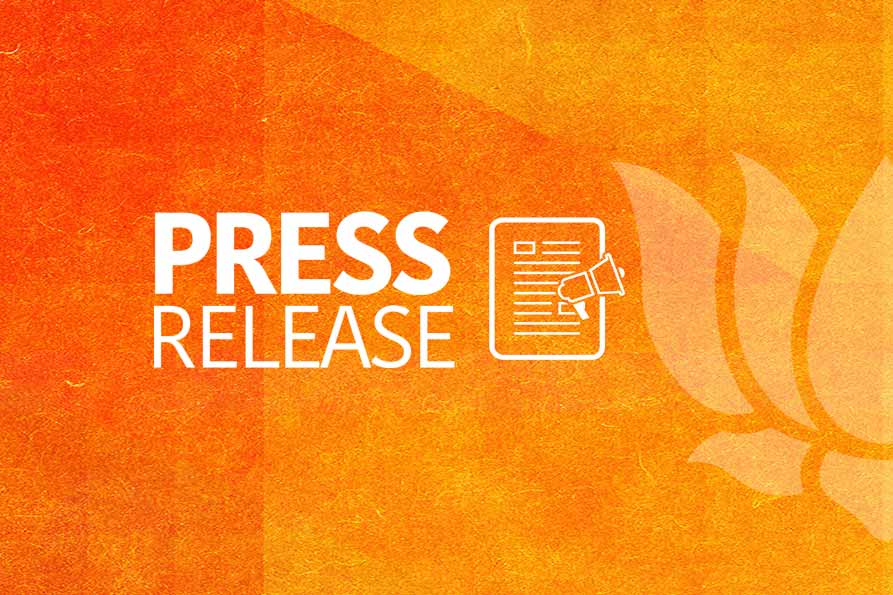
Press Statement issued by Shri L.K. Advani
Leader of the Opposition (Lok Sabha)
In Raipur (Chhattisgarh) on April 25, 2006
Developments in Nepal
|
During the course of the Bharat Suraksha Yatra, which I have undertaken jointly with my Party president Shri Rajnath Singh, I have dwelt on the problem of naxalite violence as a major theme in my mass-education campaign. Indeed, among the multiple threats to "Bharat Suraksha" that we had identified prior to the commencement of the Yatra, the one that topped the list was the threat to India's national security from "jehadi terrorism and left-wing extremism".
Subsequently, two developments have compelled me to further sharpen my focus on naxalite violence, which in its ideological genesis is actually an Indian offspring of the global monster of communist extremism. A fortnight ago, while addressing a conference of chief ministers of six states most affected by naxalite violence, Prime Minister Dr. Manmohan Singh has called this menace as "the biggest threat to India's internal security". The second development is the fast-changing political situation in neighbouring Nepal, where Maoists, who are the Nepalese offspring of the same global monster of communist extremism, have emerged as an important player.
The BJP's attitude to developments in a foreign country are based on the correct and well-established principle of non-interference in the internal affairs of that country, except when they impinge on India's national interests. Thus, for a long time, the BJP's consistent stand on the events in Nepal rested on two pillars: transfer of effective executive power to multi-party democracy and preservation of constitutional monarchy, which is a symbol of Nepal's identity and sovereignty in the same way as is the case in several other countries around the world.
Hence, in conformity with this stand, the BJP welcomes the decision of King Gyanendra yesterday to revive Nepalese Parliament. We hope that this would be a major step forward in normalization of the situation in our troubled Himalayan neighbour.
Normally, the BJP would not comment on the internal composition of the political process in another country. However, in the case of Nepal, I was constrained to say, on several occasions during my Yatra, that the Government of India's policy on developments in Nepal should ensure that Maoists do not gain an upper hand. I also criticized the UPA government's soft approach, bordering on silence and acquiescence, on the rise of Maoists in Nepal's politics.
Revealing criticism of CPI and CPI(M) leaders: I have seen media reports about leaders of the CPI(M) and the CPI criticizing my stand on Maoists in Nepal. Shri Sitaram Yechury of the CPI(M) has said, "It would be better if senior leaders of India understand the sentiments of the people of Nepal. The people of Nepal trust the Maoists more than the King." Shri D. Raja of the CPI has said, "Mr. Advani is playing a dangerous game of dividing the people of Nepal. The people do not agree with his understanding of the situation."
It is clear from these statements that the Indian communists are acting as spokesmen of the Maoists in Nepal, rather than as upholders of India's national interests in terms of the grave threat that Maoism in Nepal poses to our internal security. It is well-known to all those dealing with internal security in the central government and in all the naxal-affected state governments, that Maoists in Nepal are the twin brothers of naxalites in India. Together, they are conspiring to create a "Red Corridor" from Nepal to Andhra-Karnataka – "from Pashupati to Tirupati". When Prime Minister Dr. Manmohan Singh himself has warned that "naxal violence is the biggest threat to India's internal security", why are the communists turning a blind eye to the external linkage of this menace? It shows that a key ally of the UPA does not share the assessment of the Prime Minister on the magnitude and gravity of the naxal problem.
The BJP needs no lessons in democracy from the communists, who have scuttled it, often with brute force leading to genocides, all over the world. Communists have a long and shameful record of betraying India's national interests at every critical point in our recent history – be it during the Freedom Movement, during the 1962 Chinese aggression, or during the Emergency rule in 1975-77, when they sided with the murder of democracy in India.
We fully respect the sentiments of the fraternal people of Nepal and their aspirations for democracy. We have no objection if any section of Maoists lay down their arms, shun the path of violence irreversibly, participate in elections and join the democratic process in Nepal. In fact, we would welcome it. That would be the touchstone of their commitment to democracy. However, there are no signs of that happening so far.
For the BJP, security of the Nation – both external and internal – is of supreme importance. Therefore, I reiterate my stand that the Government of India should seek marginalization of Maoists even as it supports democracy and the process of normalization in Nepal. Secondly, I also demand that, in light of the pro-Maoist views expressed by the leaders of the CPI and CPI(M), who are key partners in the UPA, Prime Minister Dr. Manmohan Singh and Congress president Smt. Sonia Gandhi clarify their position on the Maoists.
To Write Comment Please Login



.gif)





